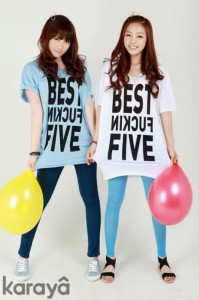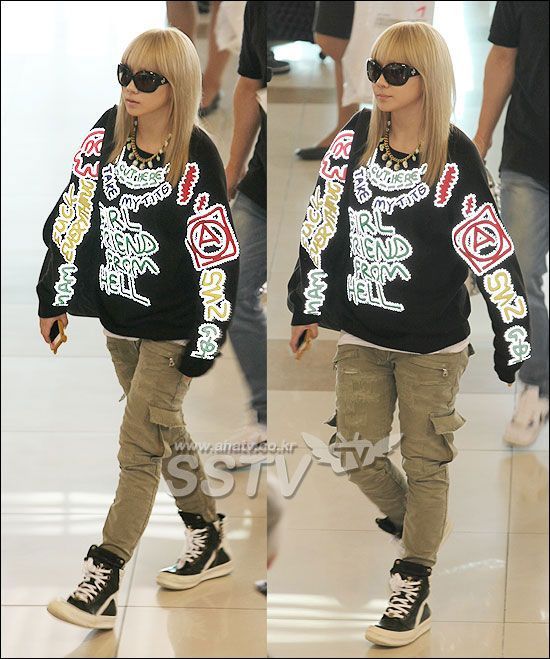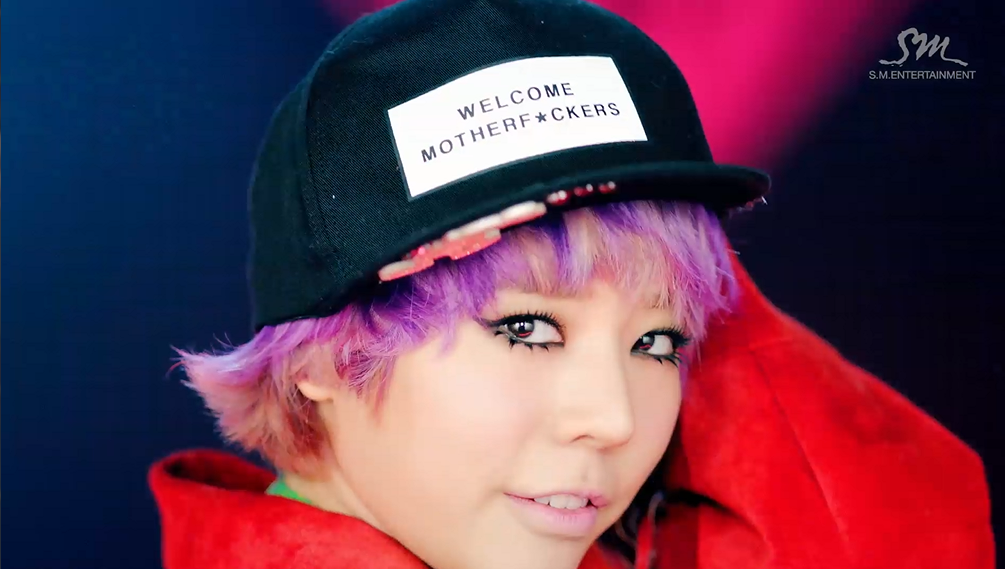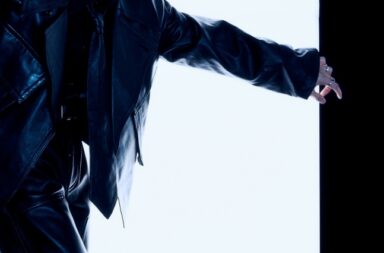Disclaimer: This article discusses the use of English-language swear words by Korean idols and is accompanied by photographs depicting these same words. In the interests of clarity, minimal censorship has been used.
It must have taken a mighty fine pair of eyes to first spot the slip-up that has sent SM Entertainment spiralling into damage control given that it lasted all of half a second. Perhaps if SONEs were less adamant in their desire to screencap every last moment of their nine angels’ every appearance nobody would have noticed the profanity emblazoned across Sunny’s snapback. Within hours of the special pre-release of SNSD’s “Dancing Queen” MV, however, the news was unquestionably out, prompting SM to withdraw and re-release (that’s a lot of releases) the MV in question. The offending phrase was also censored out of the MV for their follow up hit “I Got a Boy” by means of some hastily added stars.
But why all the fuss? The ladies of SNSD are grown women entitled to make their own statements are they not? Why should the response to their use of swear words be any different than to that of G-dragon or Jay Park? What after all is the difference between cussing in Korean or English, especially when both are highly irregular occurrences in the first place?
 K-pop is an international phenomenon and without its popularity across Asia it would not have evolved into the global sensation it is today. Many factors have contributed to its success, amongst them the enthusiasm with which it uses language to boost its international appeal. So much so, that foreign languages have been incorporated into every aspect of the industry with English hooks, Japanese and Chinese re-releases and countless loanwords making their way into K-pop’s appropriation-happy vernacular. Ironically, it is exactly this enthusiasm — in conjunction with K-pop’s rapidly expanding western following – that has given rise to the issue at hand. Straddling the cultural divide between East and West for profit was never going to be an easy task.
K-pop is an international phenomenon and without its popularity across Asia it would not have evolved into the global sensation it is today. Many factors have contributed to its success, amongst them the enthusiasm with which it uses language to boost its international appeal. So much so, that foreign languages have been incorporated into every aspect of the industry with English hooks, Japanese and Chinese re-releases and countless loanwords making their way into K-pop’s appropriation-happy vernacular. Ironically, it is exactly this enthusiasm — in conjunction with K-pop’s rapidly expanding western following – that has given rise to the issue at hand. Straddling the cultural divide between East and West for profit was never going to be an easy task.
Compared to modern Western pop, K-pop makes little use of strong language. So much so that G-Dragon’s ‘That XX’ was the first promotional single to undergo language censorship that I ever came across, despite my familiarity with several years’ worth of releases. The Korean market is still too small and too conservative to risk causing serious offence. When the words censorship and K-pop find themselves in the same sentence, it is almost invariably in relation to racy choreography or overtly sexual lyrics (or in Hyuna’s case: SNS name dropping) so maybe these are safer boundaries to push.
Let’s not forget that this is the same industry that in 2008 censored the lyrics of DBSK’s “Mirotic,” changing the English chorus from “under my skin” to the patently ridiculous “under my sky.” For a song that’s name plays upon the word “erotic” and was accompanied by an MV involving shirtless, well-muscled men in various states of bondage, one would think that a simple reference to psychological intimacy would be the least of their worries. The approach of the various departments responsible for censoring media could not be more inconsistent.
 Take SHINee, K-pop’s resident flower boys. 2012 saw the release of their fourth Korean mini-album and the consolidation of their popularity in Japan with two original singles and a second arena tour. They also took the time to dabble in some profanity, conveniently illustrating the inherent dangers of K-pop’s fondness for explicit English.
Take SHINee, K-pop’s resident flower boys. 2012 saw the release of their fourth Korean mini-album and the consolidation of their popularity in Japan with two original singles and a second arena tour. They also took the time to dabble in some profanity, conveniently illustrating the inherent dangers of K-pop’s fondness for explicit English.
First comes Onew, beloved by all, whose odd airport fashion caused quite a stir in the Shawol community last year. The joke builds on his role as SHINee’s much put-upon leader, pokes fun only at himself and his members and makes use of universally humorous and therefore harmless toilet humor. Innocent as (implicit) cussing comes.
Then there’s Taemin, an idol who has been itching to discard his girlish image for years now (a desire which has been utterly overlooked by his superiors in SM who have dolled the poor boy up in wigs for two consecutive comebacks – overlooking his stint as a love-struck eleven year old in “Hello”). Not until the boys’ latest Japanese tour however, did the extent of Taemin’s frustration become apparent. His solo stage was a metal-meets-dubstep affair (not the pop-rock remixes K-concerts are so fond of) and involved a copious amount of angst-fuelled profanity that merits a watch if only for Taemin’s earnest execution.
[youtube http://www.youtube.com/watch?v=L6TZgeijEPc&w=560&h=315]Interestingly, Taemin is not the only Korean idol to benefit from Japan’s relaxed attitude towards swearing, with (then) DBSK’s Jaejoong donning his now infamous “f*cking my way” shirt for their Japanese ‘Rising Sun’ MV. Another t-shirt, this time the property of SHINee’s resident diva Key, brings us back to the problem SNSD is currently facing. It is highly unlikely that Key understands just how offensive many people would consider a shirt (pictured below) which unites the concept of discounted products and/or services with a jeering contempt of the female genitalia to be. And all in a single bit of wordplay that wouldn’t air on TV. Which highlights just how dangerous (and unnecessary) a game these idols are playing, as they cannot possibly be familiar with the unspoken standards that dictate how Westerners react to different kinds of swear words.
The very nature of K-pop problematizes this carelessness further. Many of K-pop’s fans, both local and international, are young and impressionable. Even those idols who better fit the wayward image (and of whom we would expect nothing less/more – depending on your attitude towards cussing) owe a duty to the audiences they actively target.
It is also interesting to note that most of these idols (I’m thinking Zico, G-Dragon, CL etc.) have established themselves as successful soloists alongside (or after, in Jay Park’s case) their idol group activities. To answer a question posed earlier, maybe it is this sense of individualistic integrity that grants them more leeway with regards to swearing than idol groups such as SNSD. After all, their very image relies upon them looking to be heavily involved in creation of that same image, suggesting that any profanity was probably (hopefully) the result of an artistic choice and not a board meeting.
Nevertheless, ‘bad’ words are still words and are therefore just as valid a means of expression as any other. But tied up in obscenity are many complex socio-cultural concepts that must be understood if you are to avoid making a fool of yourself and others. It is these distinctions that idols and their agencies seem either unable or unwilling to make. Little wonder, given that for the overwhelming majority of them, English is neither their native language nor a prerequisite for employment in an industry primarily targeting Asian audiences.
In short: idols swearing isn’t wrong, it’s silly. SM censored the phrase because they were unwilling to standby its implications which means they either misunderstood (or were ignorant of) its meaning or misjudged its severity in the given context. Probably the latter given that the phrase made repeat appearances throughout the girls’ revamped wardrobe. If pressed, Key would probably do the same with regards to his shirt. It’s simply not the kind of sentiment an idol can express without drastically altering their image.
 One could still argue that K-pop is merely showing the same disregard for the culture they are buying into as wannabe hipsters tattooing the themselves with the *insert exotic language here* word for love or hope. While an ill-considered tattoo may be permanent, it is, however, a private folly and not part of a painstakingly constructed promotional image which, in this day and age, enjoys a truly global audience. As such, this issue simply represents another facet of K-pop’s reluctance to embrace the foreign cultures it is so eager to exploit.
One could still argue that K-pop is merely showing the same disregard for the culture they are buying into as wannabe hipsters tattooing the themselves with the *insert exotic language here* word for love or hope. While an ill-considered tattoo may be permanent, it is, however, a private folly and not part of a painstakingly constructed promotional image which, in this day and age, enjoys a truly global audience. As such, this issue simply represents another facet of K-pop’s reluctance to embrace the foreign cultures it is so eager to exploit.
And yet, as with any of K-pop’s (many) flaws, these slip-ups will have to go if it wishes to make any serious attempt on the American-tween market. While hardly malicious or genuinely anti-social in nature, K-pop’s critics thrive on such displays of ignorance and let’s face it, they’re not exactly hard-pressed for material. As a foreign cultural product steeped in what the West considers to be quite politically incorrect ideas about beauty and creativity, K-pop is never going to receive a warm welcome and these incidents – regardless of whether they are the result of ill-judgement or total ignorance – can only hurt its chances. It simply beggars belief that in an industry so preoccupied with international approval there should be no system in place to pre-empt this kind of foolishness.
Then again, it is entirely possible that despite the efforts of the Big 3, K-pop will never gain enough of a foothold in the West to generate this kind of scrutiny. In which case maybe we should all take a leaf out of Zico’s book and calm the f*ck down.
(SM Entertainment, YG Entertainment, SidusHQ, SSTV, Karaya, Cube Entertainment, C-JeS Entertainment, ONEW RANG)




